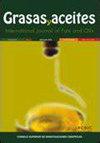从大麻籽仁中提取高品质油和脱脂粕的水化方法的优化与评价
IF 1.1
4区 农林科学
Q4 CHEMISTRY, APPLIED
引用次数: 0
摘要
人们迫切需要一种绿色高效的方法来生产高质量的油脂和脱脂粕,这促进了水合提取法的发展。本研究优化的水化方法回收了>96%的油,经红外光谱进一步证实,提取>91%生育酚、维生素A、类胡萝卜素、辅酶Q10、植物甾醇和角鲨烯成油相;而黄酮类化合物、其他酚类化合物和游离脂肪酸只提取了一小部分。脱脂餐富含水溶性维生素(包括硫胺素、核黄素、烟酸、吡哆醇、叶酸和维生素C)、蛋白质、膳食碳水化合物和磷脂。与溶剂萃取、超临界CO2和冷压法相比,水化法得到的油的AV和PV值较低,而脱脂粕的蛋白质含量(52.69%)显著高于超临界CO2和冷压法。水化法是一种可持续加工大麻籽的绿色技术。本文章由计算机程序翻译,如有差异,请以英文原文为准。
Optimization and evaluation of a hydration method for producing high quality oil and defatted meal from hemp seed kernels
A green and efficient method for producing high quality oil and defatted meal is in high demand, which has promoted the development of a hydration method for extracting oils from hem seed kernels. The hydration method optimized in this study recovered > 96% oil, which was further proved by infrared spectra, and extracted > 91% tocopherols, vitamin A, carotenoids, coenzyme Q10, phytosterols and squalene into the oil phase; while only small portions of flavonoids, other phenolic compounds and free fatty acids were extracted. The defatted meal was rich in water-soluble vitamins (including thiamin, riboflavin, niacin, pyridoxine, folate and vitamin C), proteins, dietary carbohydrates and phospholipids. The hydration method produced oils with lower AV or PV compared to solvent extraction, supercritical CO2 and cold-pressing methods and a defatted meal with a protein content (52.69%) which was significantly higher than that obtained by supercritical CO2 and cold-pressing methods. The hydration method is a type of green technology for sustainablly processing hempseeds.
求助全文
通过发布文献求助,成功后即可免费获取论文全文。
去求助
来源期刊

Grasas y Aceites
工程技术-食品科技
CiteScore
2.50
自引率
0.00%
发文量
50
审稿时长
3 months
期刊介绍:
Grasas y Aceites is a peer-reviewed journal devoted to the publication of original articles concerning the broad field of lipids, especially edible fats and oils from different origins, including non acyl lipids from microbial origin relevant to the food industry. It publishes full research articles, research notes, reviews as well as information on references, patents, and books.
Grasas y Aceites publishes original articles on basic or practical research, as well as review articles on lipid related topics in food science and technology, biology, (bio)chemistry, medical science, nutrition, (bio)technology, processing and engineering. Topics at the interface of basic research and applications are encouraged. Manuscripts related to by-products from the oil industry and the handling and treatment of the wastewaters are also welcomed.
Topics of special interest to Grasas y Aceites are:
-Lipid analysis, including sensory analysis
-Oleochemistry, including lipase modified lipids
-Biochemistry and molecular biology of lipids, including genetically modified oil crops and micro-organisms
-Lipids in health and disease, including functional foods and clinical studies
-Technical aspects of oil extraction and refining
-Processing and storage of oleaginous fruit, especially olive pickling
-Agricultural practices in oil crops, when affecting oil yield or quality
 求助内容:
求助内容: 应助结果提醒方式:
应助结果提醒方式:


